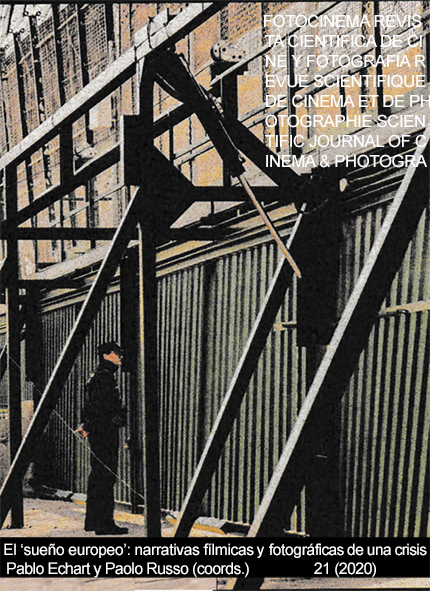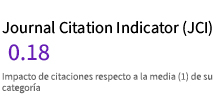The European politics of “hostipitality” in the cinema of Ruben Östlund: The Square (2017) as a case-study
DOI:
https://doi.org/10.24310/Fotocinema.2020.vi21.10005Keywords:
Ruben Östlund, European cinema, postmodernity, space, hospitality, exceptionalismAbstract
This paper analyses The Square (2017), the last film by contemporary Swedish director Ruben Östlund, through the lens of hospitality theory. Working against the ideal of an alleged “European dream”, as per Jeremy Rifkin (2004), we will argue that Östlund’s cinema explores the contradictions between the discourses on European hospitality and their materialisation in the spaces of late capitalism. In particular, we will explore the thematic and technical landmarks of his production within the context of Swedish and European cinema, namely, his personal take on the approach to the Other and his detached, almost anthropological analysis of the ethics at stake within the public and private spaces of contemporary Western societies. The Square will be taken as an example of the impossibility of an ethics of hospitality, suggesting as a conclusion that the contemporary European reality has more in common with the Derridean idea of “hostipitality” than with an idealised European dream.
Downloads
Metrics
Publication Facts
Reviewer profiles N/A
Author statements
Indexed in
-
—
- Academic society
- N/A
- Publisher
- Universidad de Málaga
References
Allard, A., & Ciment, M. (2017). Entretien avec ruben östlund: Cibler en priorite les pensées conventionnelles. Positif, (680), 11-16.
Augé, M. (1995). Non-Places. Introduction to an Anthropology of Supermodernity (J. Howe, trad.). London: Verso.
Baudrillard, J. (1998). La Sociedad de Consumo: sus Mitos, sus Estructuras (A. Bixio, trad.). Madrid: Siglo XXI.
Baudrillard, J. (1994). Simulacra and Simulation, (S. Faria Glaser, trad.). The University of Michigan Press.
Brooks, X. (2018, 11 de marzo). Ruben Östlund: ‘All my films are about people trying to avoid losing face.’ The Guardian. Recuperado de https://www.theguardian.com/film/2018/mar/11/ruben-ostlund-the-square-interview-force-majeure
BUILD Series. (2018, 22 de febrero). Ruben Östlund Speaks On His Film, ‘The Square’ [Archivo de video]. Recuperado de https://www.youtube.com/watch?v=xVYyFExKDrU&t=1s
Derrida, J. (2000). Hostipitality (B. Stocker y F. Morlock, trad.). Angelaki: Journal of Theoretical Humanities, 5(3), 3–18.
Dobson, K. (2017, 24 de noviembre). From Black Friday to Boxing Week: An Excerpt from Kit Dobson’s Malled: Decipherin Shopping in Canada. National Post. Recuperado de https://nationalpost.com/entertainment/books/from-black-friday-to-boxing-week-an-excerpt-from-kit-dobsons-malled-deciphering-shopping-in-canada
Edholm, R. (2018). Family Framing and the Comedy of Conventions in Ruben Östlund’s Force Majeure. The Nordic Journal of Aesthetics, 55–56, 116–133.
Guille, G. P. (2015). Las aporías de la hospitalidad en el pensamiento de Jacques Derrida. Eikasía: revista de filosofía, 64, 263-276.
Hjort, M. y Lindqvist, U. (2016). A Companion to Nordic Cinema. Chichester: Wiley Blackwell.
Hospitality Updated. (2017-2020). Hospitality and European Film. Universidad de Salamanca, https://hostfilm.usal.es.
Jameson, F. (1998). Postmodernism and Consumer Society. En P. Geyh, F. G. Leebron y A. Levy (Eds.), Postmodern American Fiction: a Norton Anthology. New York and London: W.W. Norton and Company: 654-665.
Jameson, F. (2002). The Dialectics of Disaster. The South Atlantic Quarterly, 101(2), 297-304.
Kant, I. (1998). Sobre la Paz Perpetua (J. Abellán, trad.). Madrid: Tecnos.
Karlsson, H. (2014). Ruben Östlund’s Play (2011): Race and segregation in ‘good’ liberal Sweden. Journal of Scandinavian Cinema, 4(1), 43-60.
Kelsey, C. (2014, 24 de octubre). Ruben Östlund’s Force of Nature. Interview Magazine. Recuperado de https://www.interviewmagazine.com/film/ruben-ostlunds-force-majeure
Lindqvist, U. (2016). The Art of Not Telling Stories in Nordic Fiction Films. En M. Hjort y U. Lindqvist. (Eds.), A Companion to Nordic Cinema. Chichester: Wiley Blackwell.
Lynch, J. (2018). “Please Leave a Message”: The Media Ecology of Ruben O?stlund’s Play, Force Majeure, and The Square. The Nordic Journal of Aesthetics, 55-56, 98-115.
Lyotard, JF. (1984). The Postmodern Condition: A Report on Knowledge (G. Bennington y B. Massumi, trads.). Minneapolis: University of Minnesota Press.
Manzanas Calvo, A. y Benito Sánchez, J. (2017). Hospitality in American Literature and Culture. London and New York: Routledge.
Moure, J. (2011). The Cinema as Art of the Mind: Hugo Münsterberg, First Theorist of Subjectivity in Film. En D. Chateau. (Ed.), Subjectivity: Filmic Representation and the Spectator’s Experience. Amsterdam: Amsterdam UP: 23-40.
Rifkin, J. (2004). The European Dream: How Europe’s Vision of the Future is Quietly Eclipsing the American Dream. Cambridge: Polity Press.
Smallwood, C. Ruben Östlund (2015, Marzo). The Fabulist. Recuperado de https://www.aesop.com/ch/de/r/the-fabulist/ruben-ostlund
Söderbergh Widding, A. (2016). A. How to Train a Director—Film Schools in the Nordic Countries. En M. Hjort y U. Lindqvist. (Eds.), A Companion to Nordic Cinema. Chichester: Wiley Blackwell.
Westerståhl Stenport, A. y Traylor, G. (2014). Playing with art cinema? Digitality constructs in Ruben Östlund’s Play. Journal of Scandinavian Cinema, 4(1), 77-84.
Downloads
Published
How to Cite
Issue
Section
License
All contents published in Fotocinema Revista científica de cine y fotografía are protected under the Creative Commons Attribution-NonCommercial-ShareAlike 4.0 International (CC BY-NC-SA 4.0) license. All about this license is available in the following link: <http://creativecommons.org/licenses/by-nc-sa/4.0>
Users can copy, use, redistribute, share and exhibit publicly as long as:
- The original source and authorship of the material are cited (Journal, Publisher and URL of the work).
- It is not used for comercial purposes.
- The existence of the license and its especifications are mentioned.
There are two sets of authors’ rights: moral and property rights. Moral rights are perpetual prerogatives, unrenounceable, not-transferable, unalienable, imprescriptible and inembargable. According to authors’ rights legislation, Fotocinema. Revista científica de cine y fotografía recognizes and respects authors moral rights, as well as the ownership of property rights, which will be transferred to University of Malaga in open access. The property rights are referred to the benefits that are gained by the use or the dissemination of works. Fotocinema. Revista científica de cine y fotografía is published in an open access form and it is exclusively licenced by any means for doing or authorising distribution, dissemination, reproduction, , adaptation, translation or arrangement of works.
Authors are responsable for obtaining the necessary permission to use copyrighted images.














13.png)



